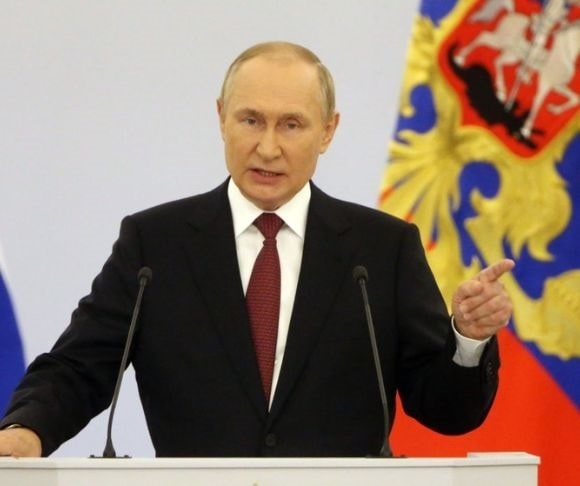Despite Vladimir Putin having explained in a 7,000-word manifesto a year ago what was on his mind, pundits continue to try predicting his next move. And that is precisely the problem. Putin plays the tune, and NATO and the US begin the waltz, always a couple of dance steps late. Behind your enemy’s calculations is never a good place to be. Figuring out what is coming before Moscow makes a move has ultimate value when the threat of nuclear weapons is on the line.
 Recently, Russia’s strongman made a speech celebrating the illegal annexation of four Ukrainian regions, Luhansk, Donetsk, Zaporizhzhia, and Kherson, loosely held by Russia’s invasion forces. In a ceremony validating the sham referenda held in the annexed states, Putin attempted to justify the move to the audience of sycophants and puppet leaders installed by the Kremlin. To many listening, it was a rambling, incoherent screed, warning the West that Moscow was now in charge and daring NATO or the US to continue supporting Kyiv in recovering the four provinces. “I want the Kyiv authorities and their real masters in the West to hear me so that they remember this. People living in Luhansk and Donetsk, Kherson, and Zaporizhzhia are becoming our citizens. Forever.” Putin challenged. “We will defend our land with all the powers and means at our disposal.”
Recently, Russia’s strongman made a speech celebrating the illegal annexation of four Ukrainian regions, Luhansk, Donetsk, Zaporizhzhia, and Kherson, loosely held by Russia’s invasion forces. In a ceremony validating the sham referenda held in the annexed states, Putin attempted to justify the move to the audience of sycophants and puppet leaders installed by the Kremlin. To many listening, it was a rambling, incoherent screed, warning the West that Moscow was now in charge and daring NATO or the US to continue supporting Kyiv in recovering the four provinces. “I want the Kyiv authorities and their real masters in the West to hear me so that they remember this. People living in Luhansk and Donetsk, Kherson, and Zaporizhzhia are becoming our citizens. Forever.” Putin challenged. “We will defend our land with all the powers and means at our disposal.”
He went on to lament the destruction of the USSR, telling the audience the consequence was “people suddenly found themselves cut off from their motherland. This tore apart and dismembered our nation, becoming a national catastrophe.” These were essentially the words Putin used back in 2005 when he called the dissolution of the Soviet Union the “greatest catastrophe” of the twentieth century. But, of course, the nations freed from Soviet tyranny disagreed with this assessment. Then, in what was a not-so-thinly-veiled justification for Russia using nuclear weapons, Putin pointed to the US as being the only nation “in the world that has twice used nuclear weapons, destroying the Japanese cities of Hiroshima and Nagasaki, and setting a precedent.”
The timing of the Russian annexation is curious. The expectation would be to gobble up portions of Ukraine while on a roll, not while losing. The Institute for the Study of War noted that Russian forces have suffered recent setbacks, describing one in the city of Lyman:
“Ukrainian forces inflicted another significant operational defeat on Russia and liberated Lyman, Donetsk Oblast, on October 1. The Russian Ministry of Defense (MoD) announced the withdrawal of Russian troops from Lyman to ‘more advantageous positions’ to avoid the ‘threat of encirclement’ in the settlement.”
General Jack Keane, US Army retired, suggested that Putin pushed the charade of a referendum because he was losing. He needed to do something over which he had control. “What Putin is dealing with here is a stunning military defeat,” Keane explained. He has “huge” losses in personnel and equipment. The casualties are on the order of 25,000 Russian soldiers killed and 65,000 wounded out of a total ground force of nearly 300,000, or nearly one-third of the invading troops. At that rate, the Motherland’s army will be a 5th-rate army in a few months. “He’s annexing territory here because he wants a political victory at home. He’s telling the people ‘we’ve gained this territory,'” Keane said.

Vladimir Putin (Photo by Contributor/Getty Images)
Lawrence Freedman, emeritus professor of war studies at King’s College London, expressed a more introspective explanation for Putin’s address. “The rant had a purpose, which was to demonstrate the irrelevance of legality … [Russia] was under no obligations to follow those rules … if it wanted to expand its borders, it was fully entitled to do so,” Freedman said. This is a divergent interpretation of Putin’s motivation. Whether the Russians were winning or losing doesn’t matter. In Freedman’s scenario, the Kremlin would be invading and taking parts of Ukraine regardless of the battle rhythm. Putin’s land grab seen as a gambit driven by destiny is more in keeping with what Moscow’s leader said in his July 2021 general Ukraine strategy declaration.
The outcome is the same regardless of which explanation one finds more applicable, Keane’s or Freedman’s. Additionally, the specter of Russia’s leadership electing to use nuclear weapons is not predicated on which position seems more appropriate. The one description of Putin’s speech that should give NATO and the US leadership pause is Freedman’s word “unhinged.” Having an adversary who is calculating, albeit evil, is one thing. Having that enemy deranged is something entirely different.
The views expressed are those of the author and not of any other affiliation.




